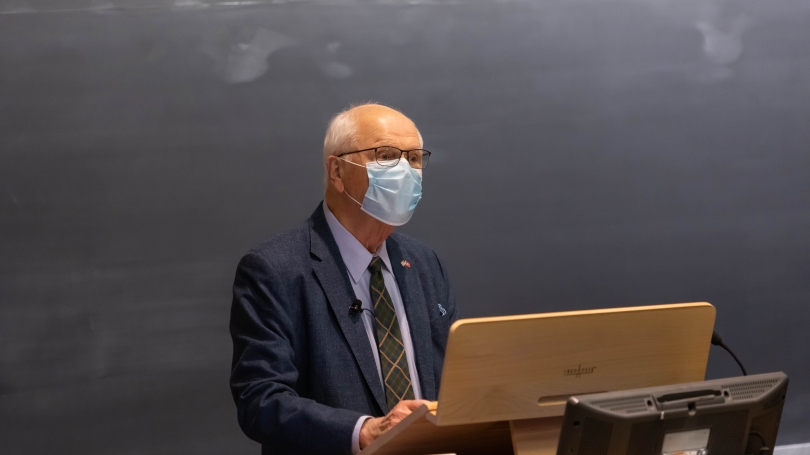
- Public Policy
- Leadership
- Funding
- News & Events
- About the Center
Back to Top Nav
Back to Top Nav
Back to Top Nav
Back to Top Nav
On November 11, 2021, the Rockefeller Center and the Dickey Center for International Understanding co-sponsored a Veterans' Day lecture by Dartmouth President Emeritus James Wright titled "Veterans Today and the Wars in Which They Have Served." Hosted by Rockefeller Center Director Jason Barabas '93, Wright invited listeners to reconsider the shifting landscape of America's wars and, in doing so, better understand the sacrifice, struggles, and valiant work of those who have served.
Having spent years giving remarks in remembrance of service members and visiting veterans to learn their stories and encourage them to continue pursuing their education, Wright noted that these experiences—and in particular, one speech at the Vietnam Veterans Memorial in Washington D.C.—inspired him to "sharpen" his understanding of those who serve, what they experience, and the challenges they face. Much of America today only hears about the details of a war—casualties, victories, losses—through numbers; however, Wright argued, "numbers can numb our recognition" of those who serve and "their humanity."
However, this dilution in America's recognition of service did not always exist. Since the Vietnam War, Wright explained, "fundamental changes in combat have reduced significantly the number and the visibility of the participants or of the loved ones who are prepared to tell the story." In particular, the way in which modern wars are fought and the goals which they wish to achieve have "asked our military forces to confront a fundamental question: how does a heavily armed military force fight when the only strategic goal is not defeat of an enemy army in the field, not securing their unconditional surrender, but instead is an elusive war on terror?"
In both the wars in Iraq and Afghanistan, Wright argued, missions were completed in a matter of weeks or months as the Taliban were driven out of government control (in the case of Afghanistan) and the search for weapons of mass destruction was completed (in the case of Iraq). However, over time, the "goals and the goalposts moved from military to political missions," forcing veterans to reconsider the results—and "even more fundamentally, the meaning" of these wars. Not only is military force no longer the only tool to be considered in warfare, said Wright, but the very function of this force is evolving away from a group meant to simply gain territorial advantage as war is increasingly defined by "small unit actions lacking dramatic victories with relatively small numbers of casualties." As a result, while battles nonetheless remain deadly, they do not generate the "front-page stories" that often inform Americans about their compatriots overseas.
As in all wars, Wright warned, "away from the front pages are the stories of human suffering by those serving and their families." Service members and their families have had to deal with lasting injuries ranging from PTSD to physical ailments. At the same time, over four times the number of service members have committed suicide in the past twenty years than have been killed in Iraq and Afghanistan.
"The great tragic irony is that these costs," Wright noted, with their exclusion from the "front page," makes them "easier to tolerate politically." This treatment of fallen service members is far different than that of the Vietnam War, where the number of people deployed and the draft made a greater number of people invested in the "human cost of war".
Not only are the lived experiences of our "all-volunteer military" force not getting the recognition they deserve, but this predominantly rural-based group of individuals, more often from the South and West and concentrated among families with a history of service, represents less than 1% of the population. At the same time, Wright explained, the issues that get the most attention within the military— including sexual assault, misogyny, and racism—are the same issues gaining attention on the national stage.
How can we get Americans more "skin in the game"? Wright agrees with a program in which young people are obligated to complete some kind of service, whether inside or outside the military (such as time with AmeriCorps or Teach For America). However, he acknowledged, it's difficult to implement a requirement like this as an "obligation" and convince all young Americans to complete it without mass attempts at evasion.
Nonetheless, Wright emphasized that "we so badly, in this Republic today, need the voices of Americans seeking to continue to serve their country." In concluding his remarks, he advised those who have not served to not only thank veterans for their service, but also to "look for ways to understand what they have done at our request. Never forget that they have served at our nation's request."
-- Written by Shawdi Mehrvarzan'22, Rockefeller Center Student Program Assistant for Public Programs